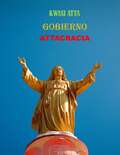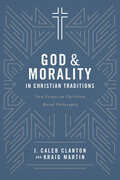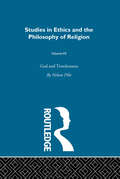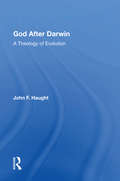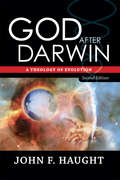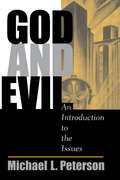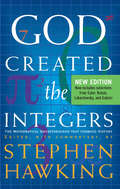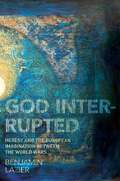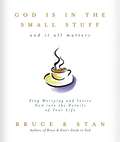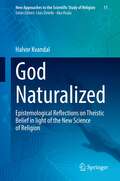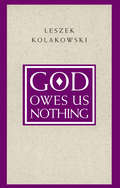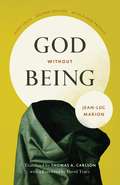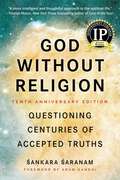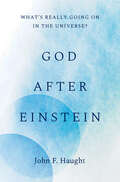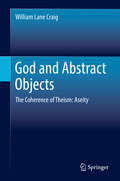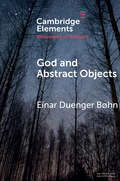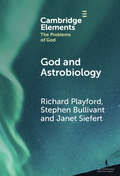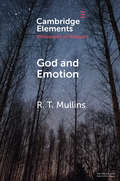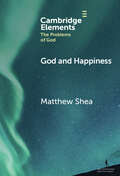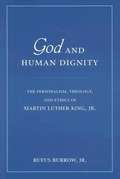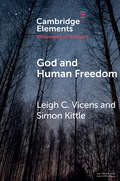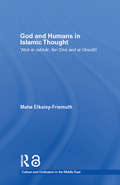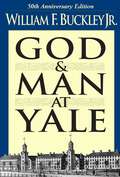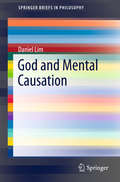- Table View
- List View
Gobierno: Attacracia
by Kwasi AttaEste libro trata de un tipo de Gobierno prescrito por Dios. Es preferible a la democracia y a todos los otros tipos de gobierno que el mundo ha experimentado. Fue rechazado por el pueblo de Israel porque eligió copiar a las naciones de su entorno. Este libro analiza sus características, ventajas, desventajas y cómo superarlas. El libro también analiza si se puede practicar hoy en día o no.
God & Morality in Christian Traditions: New Essays on Christian Moral Philosophy
by J. Caleb Clanton Kraig MartinChristianity presumes morality is connected in important ways to God.God & Morality in Christian Traditions explores a wide range of philosophical issues related to that connection, including the metaphysical foundations of morality, the Fall and its implications, and how faith can affect one’s ability to discern obligations. Also included is a robust treatment of how vice and virtue shape one’s ethical life, as well as a timely discussion of how people―both Christians and non-Christians―can address deep moral disagreement in a pluralistic society. Drawing on Catholic, Protestant, and free church traditions, this volume highlights perspectives drawn from the natural law tradition, divine command theory, and virtue ethics, among other theoretical frameworks. Along the way, the authors provide salient insights on metaethics, moral epistemology, character development, and applied ethics. Scholars and students in Christian ethics, philosophy, and theology will benefit from this carefully edited and rigorously argued collection of essays.
God & Timelessness Vol 7 (Studies In Ethics And The Philosophy Of Religion)
by Nelson PikeFirst published in 2003. This is volume VII in the IX-volume set titled Studies in Ethics and the Philosophy of Religion. The series is meant to provide an opportunity for philosophical discussions of a limited length which pursue in some detail specific topics in ethics or the philosophy of religion, or topics which belong to both fields. This volume discusses timelessness, the predicate 'timeless' in relation to God, power and two doctrines.
God After Darwin 1E: A Theology Of Evolution
by John HaughtArgues that both evolutionism and creationism rely too heavily on notions of underlying order and design. Instead of focusing on the idea of novelty in human experience novelty as a necessary component of evolution, and as the essence of divine Mystery.. In God After Darwin , John Haught argues that the ongoing debate between Darwinian evolutionists and Christian apologists is fundamentally misdirected: both sides persist in focusing upon an explanation of underlying design and order in the universe. Haught suggests that what is lacking in both of these competing ideologies is the notion of novelty, a necessary component of evolution and the essence of the unfolding of divine Mystery. He argues that Darwin’s disturbing picture of life, instead of being hostile to religion - as scientific skeptics and many believers have thought it to be - actually provides a most fertile setting for mature reflection on the idea of God. Solidly grounded in scholarship, Haught’s explanation of the relationship between theology and evolution is both accessible and engaging.
God After Darwin: A Theology of Evolution
by John F. HaughtIn God After Darwin, eminent theologian John F. Haught argues that the ongoing debate between Darwinian evolutionists and Christian apologists is fundamentally misdirected: Both sides persist in focusing on an explanation of underlying design and order in the universe. Haught suggests that what is lacking in both of these competing ideologies is the notion of novelty, a necessary component of evolution and the essence of the unfolding of the divine mystery. He argues that Darwin's disturbing picture of life, instead of being hostile to religion-as scientific skeptics and many believers have thought it to be-actually provides a most fertile setting for mature reflection on the idea of God. Solidly grounded in scholarship, Haught's explanation of the relationship between theology and evolution is both accessible and engaging. The second edition of God After Darwin features an entirely new chapter on the ongoing, controversial debate between intelligent design and evolution, including an assessment of Haught's experience as an expert witness in the landmark case of Kitzmiller v. Dover Area School District on teaching evolution and intelligent design in schools.
God And Evil: An Introduction To The Issues
by Michael L PetersonThis concise, well-structured survey examines the problem of evil in the context of the philosophy of religion. The main problem of evil consists in reconciling belief in a just and loving God with the evil and suffering in the world. Michael Peterson frames this issue by working through questions such as the following: What is the relation of rational belief to religious faith? What different conceptual moves are possible on either side of the issue? What responses have important thinkers advanced and which seem most promising? Is it possible to maintain religious commitment in light of evil? The author relies on the helpful distinction between moral and natural evil to clarify our understanding of the different aspects of the problem as well as avenues for response. Thus, the reader of this book gains not only an intellectual grasp of the debate over God and evil in professional philosophy but also the personal benefit of thinking through one of the most important issues in human life. }This concise, well-structured survey examines the problem of evil in the context of the philosophy of religion. One of the core topics in that field, the problem of evil is an enduring challenge that Western philosophers have pondered for almost two thousand years. The main problem of evil consists in reconciling belief in a just and loving God with the evil and suffering in the world. Michael Peterson frames this issue by working through questions such as the following: What is the relation of rational belief to religious faith? What different conceptual moves are possible on either side of the issue? What responses have important thinkers advanced and which seem most promising? Is it possible to maintain religious commitment in light of evil? Peterson relies on the helpful distinction between moral and natural evil to clarify our understanding of the different aspects of the problem as well as avenues for response. The overall format of the text rests on classifying various types of argument from evil: the logical, the probabilistic, the evidential, and the existential arguments. Each type of argument has its own strategy which both theists and nontheists must recognize and develop. Giving both theistic and nontheistic perspectives fair representation, the text works through the issues of whether evil shows theistic belief to be inconsistent, improbable, discredited by the evidence, or threatened by personal crisis.Peterson explains how defensive strategies are particularly geared for responding to the logical and probabilistic arguments from evil while theodicy is an appropriate response to the evidential argument. Theodicy has traditionally been understood as the attempt to justify belief in a God who is all-powerful and all-good in light of evil. The text discusses the theodicies of Augustine, Leibniz, Hick, and Whitehead as enlightening examples of theodicy. This discussion allows Peterson to identify and evaluate a rather dominant theme in most theodicies: that evil can be justified by designating a greater good. In the end, Peterson even explores how certain types of theodicy, based on specifically Christian renditions of theism, might provide a basis for addressing the existential problem of evil. The reader of this book gains not only an intellectual grasp of the debate over God and evil in professional philosophy but also the personal benefit of thinking through one of the most important issues in human life. }
God Created the Integers: The Mathematical Breakthroughs that Changed History
by Stephen HawkingBestselling author and physicist Stephen Hawking explores the masterpieces of mathematics, 25 landmarks spanning 2,500 years and representing the work of 15 mathematicians. "
God Interrupted: Heresy and the European Imagination between the World Wars
by Benjamin LazierCould the best thing about religion be the heresies it spawns? Leading intellectuals in interwar Europe thought so. They believed that they lived in a world made derelict by God's absence and the interruption of his call. In response, they helped resurrect gnosticism and pantheism, the two most potent challenges to the monotheistic tradition. In God Interrupted, Benjamin Lazier tracks the ensuing debates about the divine across confessions and disciplines. He also traces the surprising afterlives of these debates in postwar arguments about the environment, neoconservative politics, and heretical forms of Jewish identity. In lively, elegant prose, the book reorients the intellectual history of the era. God Interrupted also provides novel accounts of three German-Jewish thinkers whose ideas, seminal to fields typically regarded as wildly unrelated, had common origins in debates about heresy between the wars. Hans Jonas developed a philosophy of biology that inspired European Greens and bioethicists the world over. Leo Strauss became one of the most important and controversial political theorists of the twentieth century. Gershom Scholem, the eminent scholar of religion, radically recast what it means to be a Jew. Together they help us see how talk about God was adapted for talk about nature, politics, technology, and art. They alert us to the abiding salience of the divine to Europeans between the wars and beyond--even among those for whom God was long missing or dead.
God Is in the Small Stuff and It All Matters
by Bruce Bickel Stan JantzBruce and Stan's newest book encourages readers not to disregard the minor, insignificant things in life. Rather, "God Is in the Small Stuff..." encourages a better understanding of God's infinite character, reminding readers that He is a personal and intimate God, involved in every detail of their lives, however minute. "God Is In the Small Stuff... and it all matters" contains 40 chapters, with titles such as "Remember that God Loves You," "Discipline Yourself (No One Else Will)," and "Contentment Won't Kill You." Each chapter includes an introductory commentary in the tongue-in-cheek Bruce & Stan style, followed by bits of pithy and sometimes humorous wisdom.
God Naturalized: Epistemological Reflections on Theistic Belief in light of the New Science of Religion (New Approaches to the Scientific Study of Religion #11)
by Halvor KvandalThis volume argues that theistic philosophy should be seen not as an “armchair” enterprise but rather as a critical endeavor to bring philosophy of religion into close contact with emerging sciences of religion. This text engages with the rationality of religious belief by investigating central problems and arguments in philosophy of religion from the perspective of new naturalistic research. A central question the book analyzes is whether findings in cognitive science of religion (CSR) falsify or undermine religious ideas and beliefs. With regard to CSR, this volume offers a sustained and critical investigation of the neutrality and positive-relevance view, before offering a re-appraisal of the conflict view. The text argues that when scrutinizing these views, much more attention must be paid to specific normative premises that allow empirical findings to have epistemic relevance. A novel feature is the theoretical application of analytical epistemology in virtue-epistemology to the central question of whether CSR undermines, supports, or is neutral with respect to religious belief. This book appeals to upper-level students and researchers in the field.
God Owes Us Nothing: A Brief Remark on Pascal's Religion and on the Spirit of Jansenism
by Leszek KolakowskiGod Owes Us Nothing reflects on the centuries-long debate in Christianity: how do we reconcile the existence of evil in the world with the goodness of an omnipotent God, and how does God's omnipotence relate to people's responsibility for their own salvation or damnation. Leszek Kolakowski approaches this paradox as both an exercise in theology and in revisionist Christian history based on philosophical analysis. Kolakowski's unorthodox interpretation of the history of modern Christianity provokes renewed discussion about the historical, intellectual, and cultural omnipotence of neo-Augustinianism. "Several books a year wrestle with that hoary conundrum, but few so dazzlingly as the Polish philosopher's latest."—Carlin Romano, Washington Post Book World "Kolakowski's fascinating book and its debatable thesis raise intriguing historical and theological questions well worth pursuing."—Stephen J. Duffy, Theological Studies "Kolakowski's elegant meditation is a masterpiece of cultural and religious criticism."—Henry Carrigan, Cleveland Plain Dealer
God Without Being
by Jean-Luc MarionJean-Luc Marion is one of the world's foremost philosophers of religion as well as one of the leading Catholic thinkers of modern times. In God Without Being, Marion challenges a fundamental premise of traditional philosophy, theology, and metaphysics: that God, before all else, must be. Taking a characteristically postmodern stance and engaging in passionate dialogue with Heidegger, he locates a "God without Being" in the realm of agape, or Christian charity and love. If God is love, Marion contends, then God loves before he actually is. First translated into English in 1991, God Without Being continues to be a key book for discussions of the nature of God. This second edition contains a new preface by Marion as well as his 2003 essay on Thomas Aquinas. Offering a controversial, contemporary perspective, God Without Being will remain essential reading for scholars and students of philosophy and religion. "Daring and profound. . . . In matters most central to his thesis, [Marion]'s control is admirable, and his attunement to the nuances of other major postmodern thinkers is impressive. "--Theological Studies "A truly remarkable work. "--First Things "Very rewarding reading. "--Religious Studies Review
God Without Being: Hors-Texte, Second Edition (Religion and Postmodernism)
by Thomas A. Carlson Jean-Luc Marion David TracyJean-Luc Marion is one of the world’s foremost philosophers of religion as well as one of the leading Catholic thinkers of modern times. In God Without Being, Marion challenges a fundamental premise of traditional philosophy, theology, and metaphysics: that God, before all else, must be. Taking a characteristically postmodern stance and engaging in passionate dialogue with Heidegger, he locates a “God without Being” in the realm of agape, or Christian charity and love. If God is love, Marion contends, then God loves before he actually is. First translated into English in 1991, God Without Being continues to be a key book for discussions of the nature of God. This second edition contains a new preface by Marion as well as his 2003 essay on Thomas Aquinas. Offering a controversial, contemporary perspective, God Without Being will remain essential reading for scholars and students of philosophy and religion. “Daring and profound. . . . In matters most central to his thesis, [Marion]’s control is admirable, and his attunement to the nuances of other major postmodern thinkers is impressive.”—Theological Studies “A truly remarkable work.”—First Things “Very rewarding reading.”—Religious Studies Review
God Without Religion: Questioning Centuries of Accepted Truths
by Sankara SaranamSince Sankara Saranam's groundbreaking book God Without Religion was released 10 years ago, thousands have been enlightened by his teachings and revelations. Now, in this special 10-year anniversary edition, Sankara returns with new insights and a renewed message of spiritual guidance and inspiration. Disillusioned with organized religion, millions of people turn to secular humanism, neo-atheism, New Age thinking, Eastern religious practices, and mysticism while others retreat from spirituality altogether. A more satisfying and transformative option is to embark on a quest to discover what is real to you. Using time-tested tools of investigation into your own sense of self, you can examine your present beliefs, explore the nature of reality, and ultimately expand your identity and awareness. God Without Religion introduces this age-old approach to self-inquiry for today's readers. Step by step, it offers a bridge between organized religion and self-realization for anyone questioning traditional dogma or its legacy of divisiveness. It also assists in overcoming limitations and notions of exclusivity promoted by modern-day movements. Included are 17 universal techniques for developing a personal understanding of the underlying substance of existence and broadening your view of yourself, others, and all of life. This updated edition includes new details about Sankara's personal experiences with each technique. These highly relatable new passages will help you connect with each concept in a personal way, so that you can discover—or rediscover—your own spiritual path to clarity.
God after Einstein: What's Really Going On in the Universe?
by John F. HaughtA leading theologian presents a hopeful account of the universe after Einstein, exploring it as a meaningful drama of awakening&“This book is a deep and provocative piece of theology that proposes we engage with the universe as a kind of narrative of awakening and unfolding, as well as an important and useful approach for thinking about theology with respect to modern cosmology.&”—Matthew Stanley, New York University Before the early twentieth century, scientists and theologians knew almost nothing about time&’s enormity and the corresponding immensity of space. But now, after Einstein, cosmology offers theology a whole new way of looking at the ageless questions about matter, time, God, cosmic purpose, and the significance of our lives. The universe need not be thought of as simply an endless reshuffling of lifeless and mindless atoms in a pointless series of moments. Rather, the universe is a temporal drama of awakening whose meaning can be revealed only gradually by looking, in a spirit of anticipation and hope, toward the horizon of the cosmic future. In conversation with Einstein&’s ideas and opinions, John F. Haught develops here a new cosmological understanding of the meaning of God, time, eternity, mystery, life, thought, freedom, and faith. In doing so, he offers readers a new way of understanding the relationship of science to theology.
God and Abstract Objects
by William Lane CraigThis book is an exploration and defense of the coherence of classical theism's doctrine of divine aseity in the face of the challenge posed by Platonism with respect to abstract objects. A synoptic work in analytic philosophy of religion, the book engages discussions in philosophy of mathematics, philosophy of language, metaphysics, and metaontology. It addresses absolute creationism, non-Platonic realism, fictionalism, neutralism, and alternative logics and semantics, among other topics. The book offers a helpful taxonomy of the wide range of options available to the classical theist for dealing with the challenge of Platonism. It probes in detail the diverse views on the reality of abstract objects and their compatibility with classical theism. It contains a most thorough discussion, rooted in careful exegesis, of the biblical and patristic basis of the doctrine of divine aseity. Finally, it challenges the influential Quinean metaontological theses concerning the way in which we make ontological commitments.
God and Abstract Objects (Elements in the Philosophy of Religion)
by Einar Duenger BøhnSome believe that there is a God who is the source of all things; and some believe that there are necessarily existing abstract objects. But can one believe both these things? That is the question of this Element. First, Einar Duenger Bøhn clarifies the concepts involved, and the problem that arises from believing in both God and abstract objects. Second, he presents and discusses the possible kinds of solutions to that problem. Third, Bøhn discusses a new kind of solution to the problem, according to which reality is most fundamentally made of information.
God and Astrobiology (Elements in the Problems of God)
by Richard Playford Stephen Bullivant Janet SiefertThe perception that life on other planets would be, problematic for religious people, and indeed for religion itself, is a longstanding one. It is partially rooted in fact: astrobiological speculations have, on occasion, engendered religious controversies. Historical discussions are often far more nuanced, and less one-sided than often imagined. 'Exotheology' is a lively subdiscipline within several religious traditions. This Element offers a wide-ranging introduction to the multifarious 'problems of God and astrobiology', real and perceived. It covers major topics within Christian theology (e.g., creation, incarnation, salvation), as well as issues specific to Judaism, Islam, Buddhism, and Hinduism. It also discusses the very different perspectives offered by other (non)religious traditions, including Mormonism, various 'alien-positive' new religious movements (e.g., Heaven's Gate, Scientology, Raëlism), and the 'Ancient Astronaunt' theories popularized by Erich von Dāniken and the History channel's Ancient Aliens.
God and Emotion (Elements in the Philosophy of Religion)
by R. T. MullinsAn introductory exploration on the nature of emotions, and examination of some of the critical issues surrounding the emotional life of God as they relate to happiness, empathy, love, and moral judgments. Covering the different criteria used in the debate between impassibility and passibility, readers can begin to think about which emotions can be predicated of God and which cannot.
God and Happiness (Elements in the Problems of God)
by Matthew SheaThis Element explores the connection between God and happiness, with happiness understood as a life of well-being or flourishing that goes well for the one living it. It provides a historical and contemporary survey of philosophical questions, theories, and debates about happiness, and it asks how they should be answered and evaluated from a theistic perspective. The central topics it covers are the nature of happiness (what is it?), the content of happiness (what are the constituents of a happy life?), the structure of happiness (is there a hierarchy of goods?), and the possibility of happiness (can we be happy?). It argues that God's existence has significant, positive, and desirable implications for human happiness.
God and Human Dignity: The Personalism, Theology, and Ethics of Martin Luther King, Jr
by Rufus BurrowAlthough countless books have been devoted to the life and work of Martin Luther King, Jr. , few, if any, have focused on King's appropriation of, and contribution to, the intellectual tradition of personalism. Emerging as a philosophical movement in the early 1900s, personalism is a type of philosophical idealism that has a number of affinities with Christianity, such as a focus on a personal God and the sanctity of persons.
God and Human Freedom (Elements in the Philosophy of Religion)
by Leigh C. Vicens Simon KittleThis Element considers the relationship between the traditional view of God as all-powerful, all-knowing and wholly good on the one hand, and the idea of human free will on the other. It focuses on the potential threats to human free will arising from two divine attributes: God's exhaustive foreknowledge and God's providential control of creation.
God and Humans in Islamic Thought: Abd Al-Jabbar, Ibn Sina and Al-Ghazali (Culture and Civilization in the Middle East)
by Maha Elkaisy-FriemuthWinner of The Iranian World Prize for the Book of the Year 2007 in the Philosophy and Mysticism category. This new and original text provides a timely re-examination of Islamic thought, presenting a stark contrast to the more usual conservative view. The explanation of the relationship between God and humans, as portrayed in Islam, is often influenced by the images of God and of human beings which theologians, philosophers and mystics have in mind. The early period of Islam reveals a diversity of interpretations of this relationship. Elkaisy-Friemuth discusses the view of three scholars from the tenth and eleventh century: Abd al-Jabbar, Ibn Sina and Al-Ghazali, which introduce three different approaches of looking at the relationship between God and Humans. God and Humans in Islamic Thought attempts to shed light on an important side of medieval rational thought in demonstrating its significance in forming the basis of an understanding of the nature of God, the nature of human beings and the construction of different bridges between them.
God and Man at Yale: The Superstitions of 'Academic Freedom'
by William F. Buckley Jr."For God, for country, and for Yale... in that order," William F. Buckley Jr. wrote as the dedication of his monumental work—a compendium of knowledge that still resonates within the halls of the Ivy League university that tried to cover up its political and religious bias. In 1951, a twenty-five-year-old Yale graduate published his first book, which exposed the "extraordinarily irresponsible educational attitude" that prevailed at his alma mater. The book, God and Man at Yale, rocked the academic world and catapulted its young author, William F. Buckley Jr. into the public spotlight. Now, half a century later, read the extraordinary work that began the modern conservative movement. Buckley's harsh assessment of his alma mater divulged the reality behind the institution's wholly secular education, even within the religion department and divinity school. Unabashed, one former Yale student details the importance of Christianity and heralds the modern conservative movement in his preeminent tell-all, God and Man at Yale: The Superstitions of "Academic Freedom."
God and Mental Causation
by Daniel LimThis book lies at the intersection of philosophy of mind and philosophy of religion and operates on the assumption that dialogue between the two disciplines can be fruitful. In particular it focuses on how debates in the philosophy of mind regarding the nature of mental causation relate to debates in the philosophy of religion regarding divine action, creaturely causation, and existence of God. The book is divided into two parts. The first deals with Jaegwon Kim's so-called Supervenience Argument (SA) against non-reductive physicalism. One important observation is that the structural similarities between non-reductive physicalism and 'orthodox' theism make it convenient to co-opt non-reductive physicalist solutions to the SA in defending the possibility of creaturely causation in the philosophy of religion. The SA is used as a foil to discuss the relative merits of Malebranche's so-called Conservation is Continuous Creation Argument for Occasionalism (CCCA). Moverover, the so-called compatibilist strategy (Karen Bennett 2003, 2009) for developing a non-reductive physicalist response to the Supervenience Argument is defended and developed. This strategy is then deployed in the philosophy of religion to defend the possibility of creaturely causation against the CCCA.
